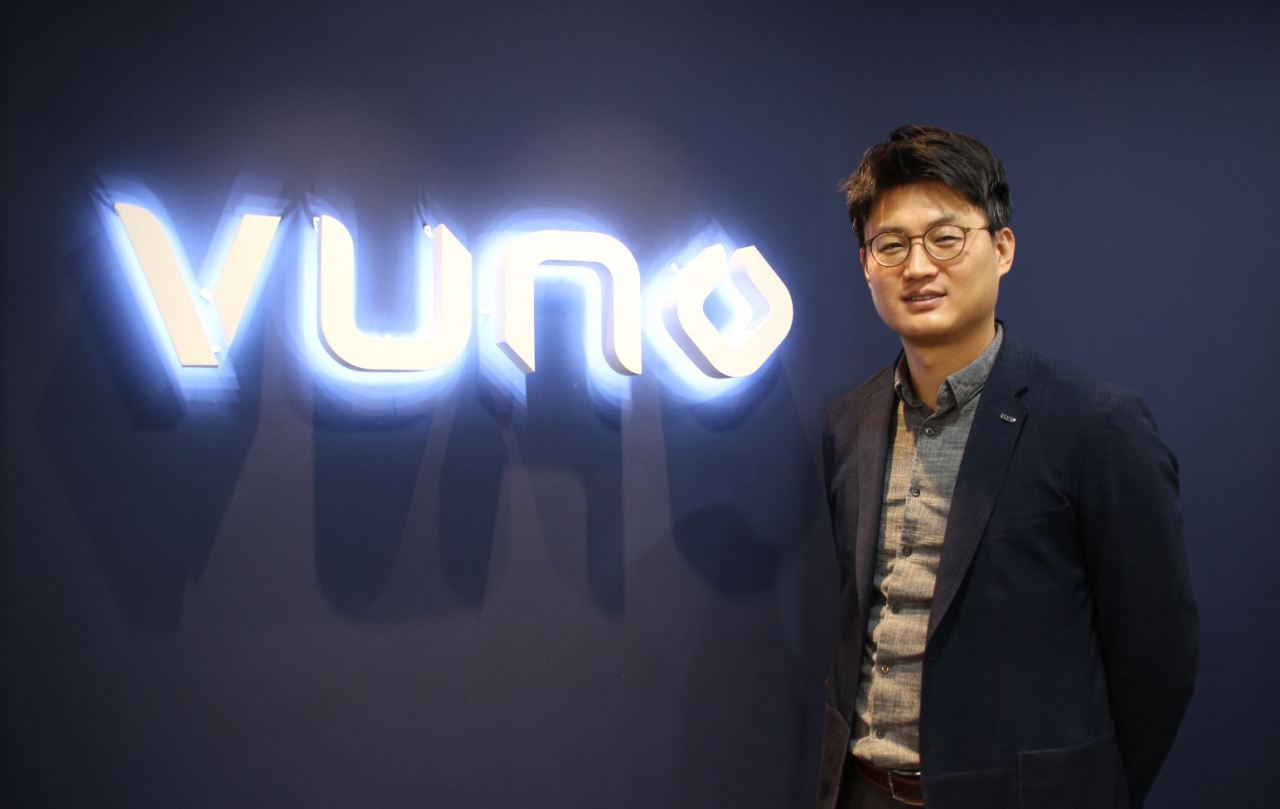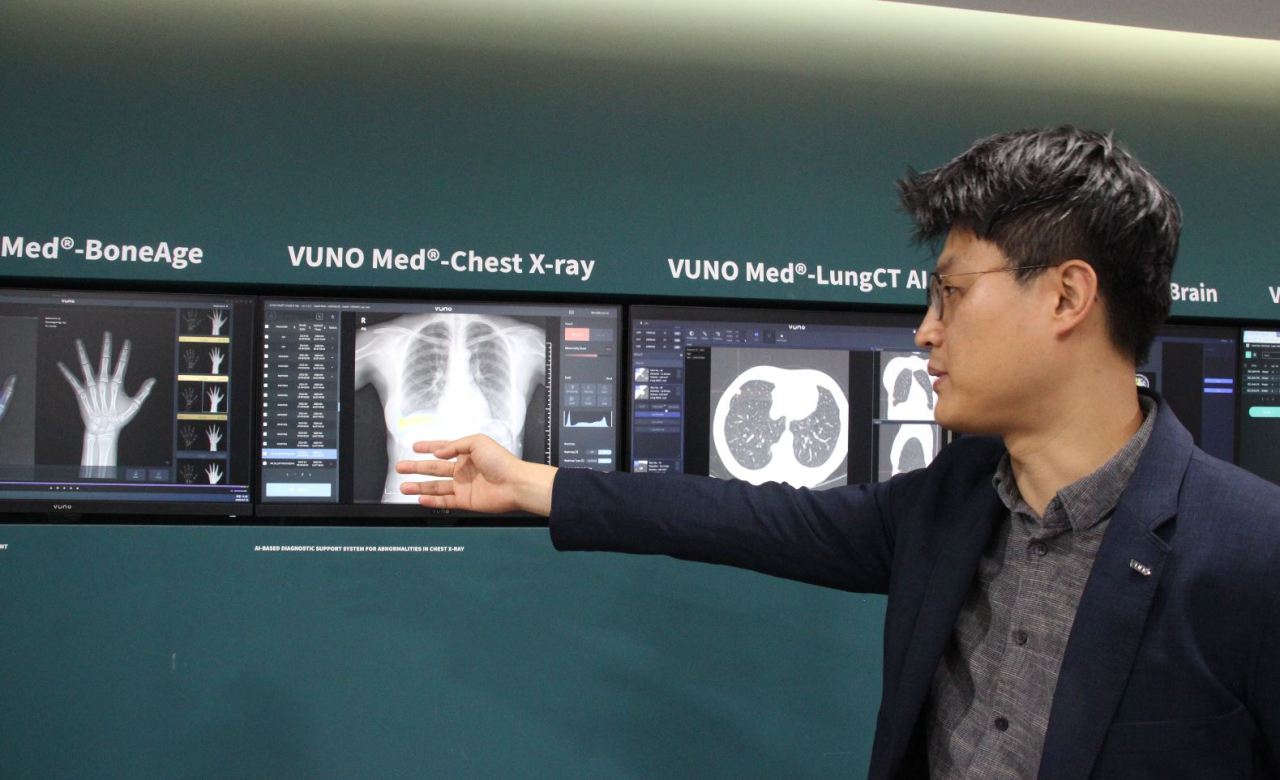[Herald Interview] What AI can do for medicine
With high ratio of medical AI in R&D efforts, Korea cannot loose footing: Vuno CTO
By Lim Jeong-yeoPublished : April 16, 2020 - 18:10

AI assistance can dramatically change the medical landscape for the better, said Jung Kyu-hwan, chief technology officer and co-founder of medical AI company Vuno, in an interview with The Korea Herald.
What AI can do is becoming clearer, giving show recommendations on Netflix and book recommendations on Amazon.
It may seem inscrutable how AI works, but really, when simplified, what it does is perform multiplications and additions in colossal volumes, simultaneously. In short, it is a task that would take humans too much time.
“Remember the days when we had to drive with a map open on a highway? And the roads will change the next year so you had to buy a new map each year?” Jung said. “And see, not even taxi drivers have anything to complain about the voice-command real-time navigation system now.”
The same evolution is happening at hospitals for doctors. It no longer makes sense for a doctor to pore over hundreds of scans to manually pin down the right case of comparison.
“There’s now a growing sentiment among doctors that using these new AI tools would benefit their work,” Jung said.
Medical AI takes up roughly 30 percent of global AI studies, and the biggest demand right now in medical AI is radiology, he added.
There are only about 3,000 certified radiologists in South Korea, and generally it takes 10 years to train new specialists.
On the other hand, the number of patients is growing exponentially due to aging society. It leaves each radiologist bombarded with X-ray and computerized tomography scans to read.
“Doctors come to us now seeking solutions to such problems,” Jung said.
What AI can do is becoming clearer, giving show recommendations on Netflix and book recommendations on Amazon.
It may seem inscrutable how AI works, but really, when simplified, what it does is perform multiplications and additions in colossal volumes, simultaneously. In short, it is a task that would take humans too much time.
“Remember the days when we had to drive with a map open on a highway? And the roads will change the next year so you had to buy a new map each year?” Jung said. “And see, not even taxi drivers have anything to complain about the voice-command real-time navigation system now.”
The same evolution is happening at hospitals for doctors. It no longer makes sense for a doctor to pore over hundreds of scans to manually pin down the right case of comparison.
“There’s now a growing sentiment among doctors that using these new AI tools would benefit their work,” Jung said.
Medical AI takes up roughly 30 percent of global AI studies, and the biggest demand right now in medical AI is radiology, he added.
There are only about 3,000 certified radiologists in South Korea, and generally it takes 10 years to train new specialists.
On the other hand, the number of patients is growing exponentially due to aging society. It leaves each radiologist bombarded with X-ray and computerized tomography scans to read.
“Doctors come to us now seeking solutions to such problems,” Jung said.

Vuno’s first project, the VUNO Med LungCT AI, kicked off a year after the company was founded in 2014, upon a joint research proposal from Asan Medical Center. The AI solution is expecting to make an official commercial launch in the near future.
Working with hundreds of hospitals since, Vuno is spearheading the medical AI development.
Vuno’s bone age assessment software is the first in the country to acquire the Drug Ministry’s approval as a AI medical device.
Vuno has brain atrophy assessment AI for detecting early signs of dementia, chest X-ray AI, fundus abnormality detection AI, and automatic speech recognition for medical professionals’ speech dictation.
“Think of each of these AI solutions as being like a smartphone app,” Jung said, “For all smartphones, be they budget or premium, they get added-value thanks to the various applications.”
An AI system can be taught in a compressed period of time, and once taught, its brains can be transplanted to innumerable devices.
AI does not sleep, does not take breaks, does not die. In turn, young doctors who train with these AI systems would experience faster growth and make diagnoses that he or she can be more confident of, said Jung.
An experienced doctor may not need an AI system -- for instance, they may already know based on experience that a patient with a certain shape of tumor has only six months to live, Jung went on to explain.
It is here that AI could offer a tangible training guidance -- it could assess the severity of the tumor growth through instant comparison with previous cases, he added.
Vuno was found in end-2014 by three former researchers of Samsung Advanced Institute of Technology.
Chairman Lee Ye-ha, CEO Kim Hyun-jun and CTO Jung used to sit next to each other at Samsung, where they researched for voice-command AI Bixby development. Their initial focus on software for autonomous vehicles quickly shifted to medical AI by seeing its potential growth.
Vuno wishes to be vender-neutral, and cater to all health care electronics and medical device companies, as well as doctors and hospitals, Jung said.
In the long run, Vuno’s goal is to provide AI solutions not only limited to imaging analysis but also in discerning patients’ vital signs that will tell indications of sepsis or other life-threatening complications for preventive medicine.
It is in talks with wearable medical devices companies interested to top their gadgets with AI.
This is a crucial time for the Korean medical AI industry to gain a meaningful global market share, Jung said.
“Medicine is a very important field for AI, and if we do not nurture it accordingly, we may lose our footing to other global tech giants,” Jung said.
An eased regulation for patient health data use for AI development would help, on the ethical condition that the data is anonymized and untraceable back to the person, he added.
Vuno plans to make an initial public offering within this year. As of April 2020, Vuno has over 100 staff.
By Lim Jeong-yeo (kaylalim@heraldcorp.com)








![[KH Explains] How should Korea adjust its trade defenses against Chinese EVs?](http://res.heraldm.com/phpwas/restmb_idxmake.php?idx=644&simg=/content/image/2024/04/15/20240415050562_0.jpg&u=20240415144419)










![[Today’s K-pop] Stray Kids to return soon: report](http://res.heraldm.com/phpwas/restmb_idxmake.php?idx=642&simg=/content/image/2024/04/16/20240416050713_0.jpg&u=)